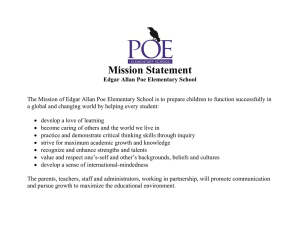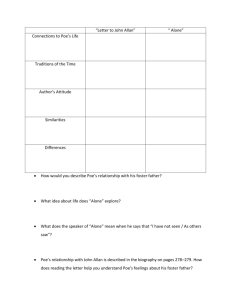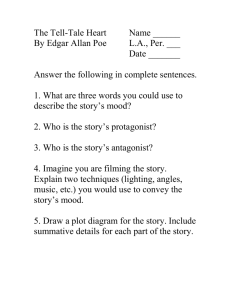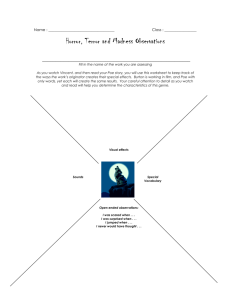Edgar Allan Poe Elementary School Language Policy 2015
advertisement
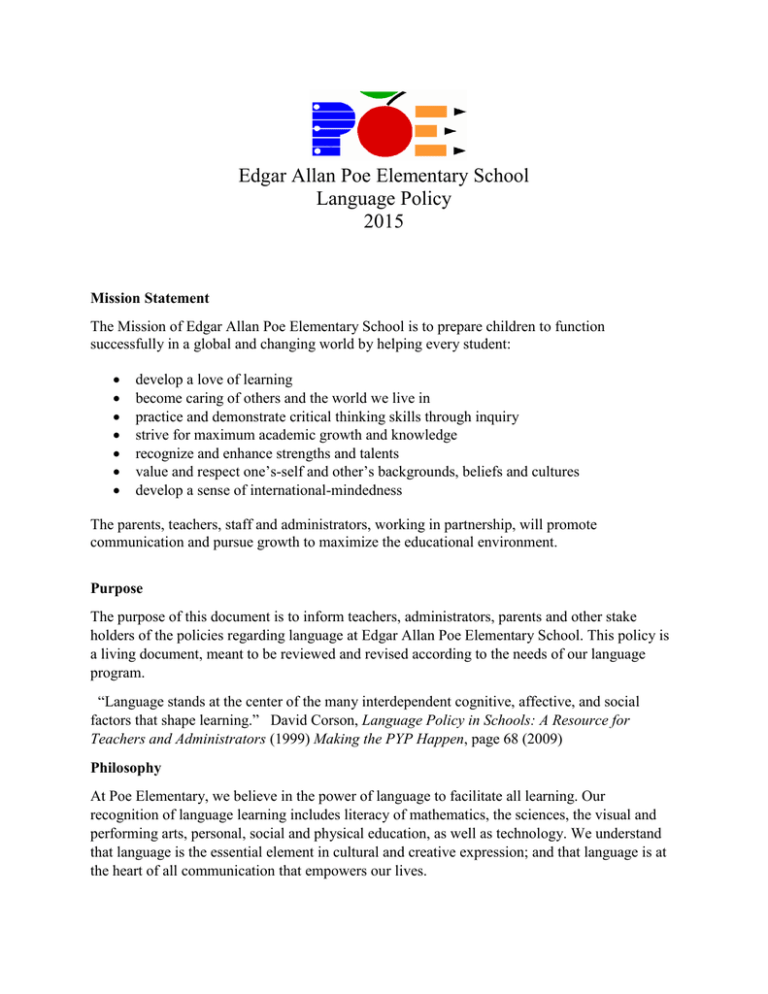
Edgar Allan Poe Elementary School Language Policy 2015 Mission Statement The Mission of Edgar Allan Poe Elementary School is to prepare children to function successfully in a global and changing world by helping every student: develop a love of learning become caring of others and the world we live in practice and demonstrate critical thinking skills through inquiry strive for maximum academic growth and knowledge recognize and enhance strengths and talents value and respect one’s-self and other’s backgrounds, beliefs and cultures develop a sense of international-mindedness The parents, teachers, staff and administrators, working in partnership, will promote communication and pursue growth to maximize the educational environment. Purpose The purpose of this document is to inform teachers, administrators, parents and other stake holders of the policies regarding language at Edgar Allan Poe Elementary School. This policy is a living document, meant to be reviewed and revised according to the needs of our language program. “Language stands at the center of the many interdependent cognitive, affective, and social factors that shape learning.” David Corson, Language Policy in Schools: A Resource for Teachers and Administrators (1999) Making the PYP Happen, page 68 (2009) Philosophy At Poe Elementary, we believe in the power of language to facilitate all learning. Our recognition of language learning includes literacy of mathematics, the sciences, the visual and performing arts, personal, social and physical education, as well as technology. We understand that language is the essential element in cultural and creative expression; and that language is at the heart of all communication that empowers our lives. We support the theory that multilingual learners are better equipped to communicate globally, thus instilling one of the many facets of open-mindedness. Practice English is the language of instruction at Poe Elementary. Instruction in language includes learning about the elements and mechanics of language, using language as a means to inquire, expressing ideas and concepts within our transdisciplinary curriculum, and appreciating the aesthetics of various forms of communication. Learning about the elements and mechanics of language. Poe Elementary implements a Balanced Literacy Block that is informed by the pedagogy of The Daily 5 by Boushey and Moser. The components include read-alouds, phonics, guided reading, workstations, minilessons, interactive writing, journaling, writing workshops, story dictation and dramatization. Instructional formats include flexible grouping within the classrooms i.e., whole group and small group instruction, partners, independent practice, as well as interactive software programs. The underlying premise of these instructional strategies and formats is to provide a combination of teacher direction and student choice. Learning these fundamentals of language allows for greater depth of understanding in all endeavors Using language as means to inquire. Language is a primary vehicle that connects and facilitates learning in our inquiry-based classrooms. It provides the means to explore, identify, pursue and communicate what we want to know, what we are learning and how to investigate and acquire more knowledge. In our classrooms, we encourage discussion, brainstorming, questioning, writing, listening and presenting in many different forms of communication – visual, oral, digital, graphic, kinesthetic, and non-verbal. Expressing conceptual understanding within transdisciplinary curriculum. Developing language skills and concepts provides learners with multiple lenses to understand and synthesize our transdisciplinary curriculum. Developing conceptual understanding requires learners (students and teachers) to make connections between disciplines - by integrating and transferring content through the use of skills, also known as, approaches to learning – thinking, research, communication, social and self-management. Appreciating the aesthetics of various forms of communication. As a fine arts magnet school, our goal is to develop creative thinkers and performers in the arts that recognize and appreciate how the arts, through time, have continued to distinguish as well as connect all cultures and societies. We seek to allow each child the opportunity to discover and develop their individual talents in the arts and to understand the relationships between academics and the arts. Therefore, we embed the love and appreciation of language, in all its forms, into our programme of inquiry. We provide opportunities to appreciate the “craft” involved in all forms of communication. Language B At Poe Elementary, Language B is Spanish, with the purpose to introduce students to the Spanish language and Hispanic/Latino culture of the Spanish-speaking world. The instructional goal is for students to learn the rudiments of the language to be able to speak with basic interpersonal communication skills. A second instructional goal is for students to know and appreciate the distinctive qualities and contributions of the Spanish speaking world throughout history. All students in second through fifth grade English instructed classes have Spanish instruction once a week. The Spanish teacher rotates to each of these classrooms. Bilingual Program Bilingual classes at Poe Elementary is defined as Transitional Bilingual Program. This program is offered to students whose home language is Spanish and who is identified as having limited English proficiency. The model provides instruction primarily in English when entering pre-kindergarten or kindergarten and progressively transitions to English by the end of third grade. A bilingual classroom is provided in fourth grade, for those students still needing the support of their home language in Spanish if necessary. The students in fourth grade take the state required assessments (STAAR) in English. The rules adopted by the State Board of Education (SBOE) and the Commissioner of Education are part of a larger body of state agency rules that are collected and published by the Office of the Secretary of State as the Texas Administrative Code (TAC). SBOE and commissioner’s rules are codified under Title 19, Part II, of the TAC. Bilingual/ESL Programs in Texas must comply with the State’s rules under Chapter 89. The Texas English Language Proficiency Standards (ELPS) are set forth in Title 19, Chapter 74.4 of the Texas Administrative Code (TAC) and were approved by the State Board of Education in 2007–2008. The ELPS outline the instruction school districts must provide to ELLs in order for them to have the full opportunity to learn English and succeed academically. The ELPS are to be implemented as an integral part of the instruction in each foundation and enrichment subject of the TEKS. Teachers in Bilingual/ESL programs must teach the TEKS skills for the assigned grade level/subjects. All of the bilingual classes are taught by certified bilingual teachers. They are required to complete state and district professional development courses to keep updated on the latest standards of the bilingual program. The bilingual classrooms, as all classrooms in our school practice speaking, listening, reading and writing skills that are incorporated into each of the units of inquiry, both in English and Spanish, by grade appropriate percentages of each language. The Texas English Language Proficiency Assessment System (TELPAS) is administered yearly to monitor the effectiveness and language differentiation in the bilingual students’ learning process. English as a Second Language At Poe Elementary, we have students from all parts of the world, whose home language is not English. We provide support for these students in classrooms taught by a certified English as a Second Language (ESL) teacher. We have at least one teacher for each grade level who is certified ESL. Students in these classrooms are immersed in English, while provided support with supplemental aides, tutoring and counseling, Mother tongue support The media centers will serve as support by providing translations and meaning to English literature. Books and other resources will be provided in various languages spoken by students. Home communication, as well as any needed translation services will be provided in the students’ and/or parents’ mother tongue. Support for Language Development Edgar Allan Poe Elementary has several support services available to help students in their language development. These include: Special Education: Students who have met the eligibility guidelines to receive Special Education services are supported by the classroom teacher and Special Education department staff. The special education teachers and the classroom teacher work hand in hand to implement the student’s IEP. All services are provided with consideration to the least restrictive environment, considering first providing support within the student's general education classroom if appropriate. Gifted and Talented: Students in grades Kindergarten-5th who have been identified as Gifted and Talented receive services from the classroom teacher. Teachers work closely with students to provide depth, complexity and enrichment to math and language lessons. Implementation, Review and Revision The Edgar Allan Poe Elementary Assessment Committee members include the PYP Pedagogical Leadership Team members, the librarian and the campus technologist. The language policy will be communicated with parents by the teachers and administrators. The school technology specialist will post the policy on the school website. The implementation of this policy will be evaluated by the IB Pedagogical Leadership Team during classroom observations, parent/student /teacher conferences and school presentations. The Edgar Allan Poe Language Policy will be effective January, 2015. It will be reviewed in August, 2015, or as needed by the assessment committee. Library See attachment Library. Resources . Guidelines for developing a school language policy, IBO . Making the PYP Happen, A curriculum framework for international education . Language Scope and Sequence, IBO
